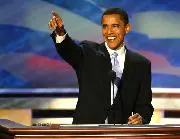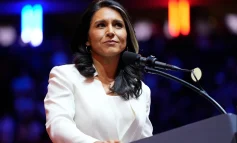Iowans gathered last week to deliberate about who they would like to represent their party in this year’s presidential race. In about 3,500 caucuses, or political meetings, roughly 10% of Iowa’s partisan voters met throughout the state to kick off this year’s primary season. Democratic candidate Barack Obama finished ahead of John Edwards and Hillary Clinton with 37%. Edwards and Clinton were nearly even at 30% each. The rest of the Democrats garnered little support.Among Republicans, Mike Huckabee finished ahead of the rest with 34% support. Mitt Romney came in second with a quarter of the votes. Fred Thompson was third with 14%, followed by John McCain (13%) and Ron Paul (10%). Rudy Giuliani only received 4% of the vote.More than 125,000 Democrats and 80,000 Republicans met despite the nearly two hour commitment of many of the caucuses and the freezing temperatures. Turnout to the caucuses was heavier than expected. “I know we are seeing incredible participation right now,” said Carrie Giddins, spokeswoman for the Iowa Democratic Party.Since 1972, Iowa’s caucuses have come first in the election race, before the primary elections in other states. Candidates usually invest a lot of time and money to win in Iowa since a victory there often means a front-running position. More than 50,000 television ads costing a total of $42 million aired in the state already, according to the Wall Street Journal. Republican candidate Mitt Romney appeared at more than 235 public events.Roughly half of the winners in Iowa go on to represent their respective party in the general elections in November. On the day of the caucuses, polling showed that Barack Obama, Hillary Clinton and John Edwards were neck-and-neck among Iowa Democrats in the final moments. A daily Reuters/C-SPAN/Zogby tracking poll found 31% supporting Obama, 27% Edwards 27%, and 24% Clinton. On the other side, Mike Huckabee and Mitt Romney were close in the lead-up to the caucuses despite the fact that Romney outspent Huckabee by more than $5 million on TV advertising. Many analysts predicted that a strong turnout by religious Christians would benefit Huckabee, a former Baptist minister.Other candidates invested little time and effort in Iowa, choosing instead to focus on states they are likely to do better in. John McCain, for instance, looks towards New Hampshire, and Michigan, where he was endorsed by The Detroit News. Rudy Giuliani expects to fare better in Florida.For the people of Iowa, the most important issues are the war on Iraq and immigration. Obama, who is from nearby Illinois, ran on a platform of bringing change. Huckabee appeals more as a common man, rather than as a politician. Both aim to appear as outsiders, given the high levels of distrust with the political elite.While there is no guarantee that victory in Iowa leads to the party nomination, the Huckabee and Obama campaigns are encouraged by the win. After the Iowa caucuses, many of the candidates headed to the next state, New Hampshire, to continue the race for the Presidency. Two Democratic candidates, Senators Joeseph Biden of Delaware and Chris Dodd of Conneticut withdrew from the race for presidential nomination Thursday after failing to garner serious support in Iowa’s precint caucuses.






Leave a Reply